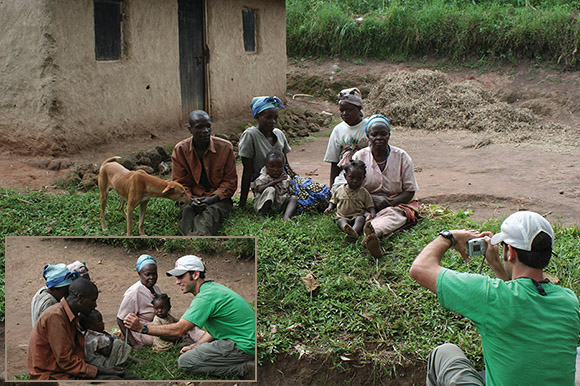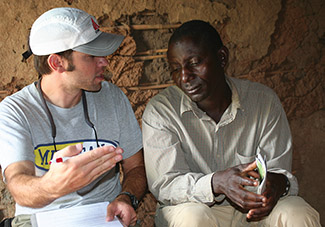 |
 |
| current issue |  |
past issues |  |
send a letter/news |  |
address update |  |
advertise |  |
about us |  |
alumni home |
In the Balance
Page 2 of 5
Previous | Next
Stumbled upon. That's the phrase Hartter uses to describe how he first visited Uganda and how he later became a human-environment geographer. He grew up near Detroit, studied mechanical engineering and German at the University of Michigan, and got a job in the heavy transport industry. Though he was working as an engineer, his heart was in conservation. So he went on for a master's in forest engineering at Oregon State and then a doctorate in geography at the University of Florida. On a whim in 2001, Hartter visited South Africa and Zambia. He loved Africa instantly; it felt like where he needed to be. Several years later an adviser gave him a book on Kibale, and it switched Hartter's focus to Uganda. "I spent 14 weeks there and was sold," he recalls. By the time he arrived at UNH in 2007, he had already made three research forays and was lining up funding to continue. His visits during the summer dry season dovetail with his teaching semesters in Durham. Spearheading a growing network of bio-geographical researchers, he is now a principal investigator or a team member on seven projects that have been awarded a combined $1.6 million in grants. As if hurrying to keep up with it all, Hartter talks fast, in short sentences as tightly connected as the social and ecological systems he studies. In the bush, he's famous for rising early to take a morning run before his 16-hour workday. The stark contrasts of Uganda create a momentum that propels him. A century ago, Winston Churchill called the landlocked sub-Saharan colony "the Pearl of Africa" for its lush natural beauty. But 100 years of war, poverty and famine have dimmed its luster. Though the last two decades have brought relative political and economic stability, human rights abuses and other problems remain. Malaria and HIV/AIDS pose widespread threats, and anthrax has been spreading in animals. Only 5 percent of the people live in areas with sewage systems. In parts of the country, poachers roam the bush and gunmen control the highways. And everywhere, crowding dictates the rhythm of life. About the size of Oregon, Uganda is crammed with 35 million people. It's one of the most densely populated places on the planet, with one of the fastest growth rates. More than half the population is under age 18—many of them cared for by grandparents because their parents have died of AIDS. In the Kibale border areas that Hartter studies, people subsist on small plots of land whose crop yields decline each year. They make an average of 85 cents a day.
As a laboratory of biodiversity hot spots, the Albertine Rift is one of the globe's hottest. "There are species that exist nowhere else in the world, as well as very important great apes like chimpanzees and mountain gorillas," Hartter says. "But the people are just trying to put food on the table and live to see another day. They don't have the luxury of thinking about long-term sustainability." In other words, if you aim to study ways to balance sustainable conservation with sustainable livelihoods, there's no better place to be. Getting there isn't easy. Researchers headed into Uganda need top-down clearance; if anyone, from high-ranking officials to local leaders, says no, the project is off. For that reason, other scholars often seek out Hartter. Not only has he met the leaders of 250 villages, but he is respected enough to have been given an empaako, or nickname. When people learn that he's known as Apuuli—which translates as "little pup" or "little boy"—he says it "puts a smile on their faces and they'll be superfriendly." Hartter laughs now to think he once believed his three years studying Swahili would help him in Uganda. Though Swahili is the country's national language, it's the language of the military and police; local people avoid it. So Hartter travels with an interpreter. He and his team take care to approach any new village in a respectful fashion, which means walking in, not driving. If a local leader is going to ask for a bribe, this is when it happens. But Hartter refuses to hand over money for access. Instead, he presents a gift of good will. He has learned never to venture into the bush without his most appreciated offering—laundry soap. "It sounds very token, but a bar of soap is worth more than the average daily working wage," Hartter explains. "It's given to the women, so it's a gift for the entire family. We go through cases and cases of soap." |
blog comments powered by Disqus



